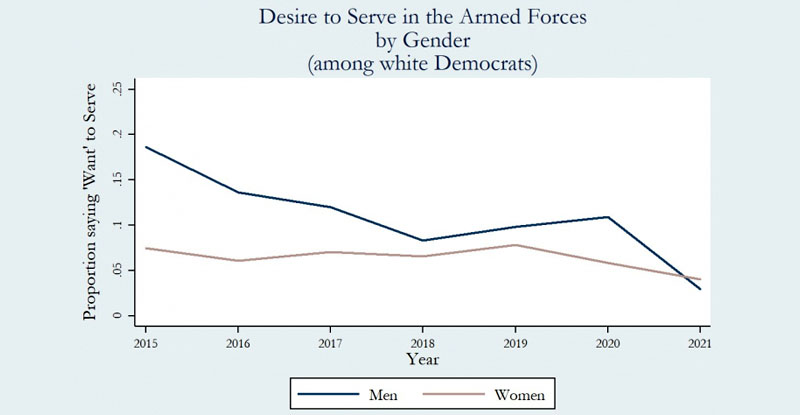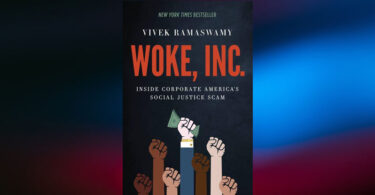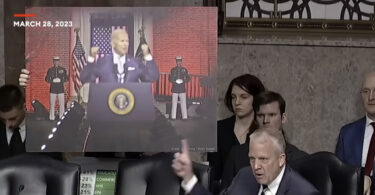The U.S. military is facing an “unprecedented” recruitment crisis, with most branches of the armed forces failing to meet their enlistment goals in 2022.
This recruitment crisis is partly a function of the fact that so few young people are now able to serve due to obesity, educational deficiencies, mental health problems, or criminal records. In fact, “only 23% [of American youth] are physically, mentally, and morally qualified to serve without receiving some type of waiver.”
The recruitment crisis is not entirely a consequence of these metastasizing physical, mental, and moral problems, however. It is also a direct result young people’s growing unwillingness to serve. The most recent estimates “show that only 9% [of America’s youth] are even interested in military service.”
Why are so few young people willing to serve in the military?
According to some conservatives, the Pentagon’s increasingly “woke” diversity, equity, and inclusion (DEI) policies are alienating the groups most inclined to serve in the armed forces (namely, conservative, Southern, and rural whites).
Consider, for example, Jimmy Byrn’s recent article in the Wall Street Journal. Byrn writes, the Pentagon’s “woke” policies “have amounted to a form of antirecruitment for prospective enlistees. The Pentagon is appealing to activists at the expense of those most likely to serve. The military has historically drawn an outsize proportion of recruits from conservative Southern states.”
Similarly, Thomas Spoehr argues that: “Wokeness in the military…acts as a disincentive for many young Americans in terms of enlistment…Is anyone surprised that potential recruits—many of whom come from rural or poor areas of the country—don’t want to spend their time being lectured about white privilege?”
The Pentagon and some on the left have pushed backed against these claims. According to the Associated Press, “Army leaders said very few say they are deterred from enlisting due to ‘wokeness,’” with only 5% listing it as a reason to not enlist.
Citing this report, an MSNBC piece claimed “New data shatters the right-wing myth that a ‘woke’ army is deterring recruits.” Going further, the article claims that the problem is actually that “the Army isn’t woke enough.”
So who’s right about recruitment? An examination of the publicly available data shows that conservative observers have correctly intuited that the military faces a profound political problem.
They are, however, mistakenly locating that problem among white Republicans, white Southerners and white rural residents and they are mistakenly attributing that problem to the Pentagon’s “woke” DEI.
For their part, the Pentagon is also misdiagnosing the origins of the recruitment crisis. By narrowly defining “wokeness” to include only the military’s current personnel policies, they are missing the way that growing “wokeness” in the political attitudes of young people might undermine willingness.
To be more precise, they are blinding themselves to the fact that a major cause of the recruitment crisis is the increasingly negative attitudes that young, white Democrats harbor toward the country and toward the military.
Let me explain. Every year, the Monitoring the Future (MTF) survey collects a “large, distinct, nationally representative samples of 12th-grade students.” The survey asks, “Suppose you could do just what you’d like and nothing stood in your way. How many of the following things would you WANT to do? Serve in the armed forces?”
If the military’s increasing “wokeness” is driving conservative, Southern, and rural whites away from military service, we should see their disaffection in responses to this question.
An examination of the MTF data show that Republican, Southern, and rural whites have not, yet, been alienated by the Pentagon’s increasing “wokeness.”
In 2015, for example,18.1% of white Republicans expressed a desire to serve in the military. In 2021, that number was 18.9%. Similarly, the percentage of white Southerners who wanted to serve in the military remained unchanged between 2015 (16.2%) and 2021 (16.6%).
The same story applies to whites living outside of large metropolitan areas, with 16.5% wanting military service in 2015 and 16.6% wanting it in 2021.
In short, there is no evidence that white Republicans, Southerners or rural residents have (so far) been disincentivized from service by policies emphasizing “anti-racism,” “gender-sensitivity” or “white privilege.”
By contrast, there has been a massive decline in desire to serve in the military among the whites most likely to hold “woke” political views (i.e. Democrats).
In 2015, 12.2% of young white Democrats wanted to serve in the military. That number fell to 3.6% in 2021.
Shockingly, most of the collapse in white Democratic interest occurred among young men.
In 2015, 18.6% of young, white Democratic men expressed a desire to serve in the military (only slightly lower than the 19.9% of non-Democratic men who wanted to serve). By 2021, that number had dropped to only 2.9%.
In fact, young black men (12.1%), young Hispanic men (14.3%) and young, white Republican men (25.3%) were all at least 4x more likely than young, white Democratic men in 2021 to “want” to serve in the armed forces.
Young Democratic white men were also significantly less interested in military service than young black women (9.5%) and young white Republican women (10.9%).
Why have young white Democrats (especially men) soured on military service?
In addition to the economic benefits associated with enlistment, previous research has shown that patriotism is also an important predictor of military service. Attitudes towards the military as an institution also play a key role.
While there is no publicly available data specifically measuring the patriotism or military attitudes of young, white Democrats, all of the data we do have suggests that this group views the country and the military in increasingly negative terms.
Gallup, for example, finds pride in being American has fallen more than 20% among Democrats since 2015.
Gallup also shows that young people express far less national pride than older people (with only 25% of 18-34 year olds saying they are “extremely” proud to be American).
Similarly, the Fall 2021 Harvard Youth Poll asked 18-29 year olds, “Which statement comes closest to your own view? ‘America is the greatest country in the world’ or ‘There are other nations as great or greater than America.’”
As the survey’s report summarizes, “The views of Democrats and Republicans are inverted with 21% of Democrats saying America is the greatest country and 64% saying other nations are as great or greater; 62% of Republicans believe that America is the greatest with 24% saying other nations are as great or greater.”
The same poll also discovered that 32% of Democrats believe they are “less patriotic” than their parents.
Relatedly, a disparate collection of surveys suggest that young, white Democrats have disproportionately negative views towards the military.
The Reagan National Defense Forum’s (RNDF) annual surveys, for instance, show a massive decline in “trust and confidence” among young people (falling from 87% in 2018 to 67% in 2021) and Democrats (falling from 92% in 2018 to 76% in 2021).
A 2022 Morning Consult survey found only 55% of Gen Z (compared to 86% of Boomers) have “some” or “a lot” of trust in the military.
Recent data from the Pew Research Center found that only 49% of 18-29 year olds believe that the military has a “positive effect” on the “way things are going in the country these days.”
These dramatic attitudinal shifts should not be surprising to anyone who has followed the “Great Awokening” of white liberals over the last eight years. In addition to becoming far more progressive on questions of race, gender, and immigration, young white Democrats have also become far less patriotic and supportive of the American military.
A predictable consequence of these increasingly negative attitudes is a growing disinterest in military service.
The interrelated set of highly progressive political beliefs, best characterized as “wokeness,” in other words, could represent a threat to the continuation of America’s all volunteer armed forces.
All of this means that economic and DEI-centered solutions to the recruitment crisis will fail.
More generous benefits and more “wokeness” in personnel policies are unlikely sound persuasive to a large but increasingly reluctant demographic that is increasingly suspicious of the country and the military.
If the Pentagon is interested in winning the recruitment war, it must realize that it can’t be done with economic weapons and HR policies alone.
–
By Kevin Wallsten, a professor in the Department of Political Science at California State University, Long Beach.








Leave a Comment